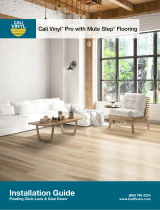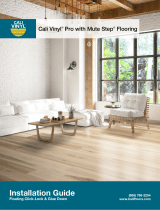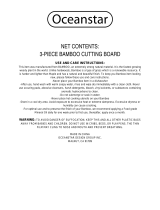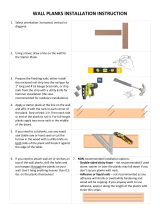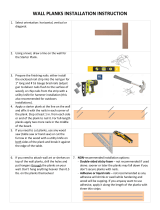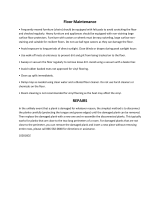Page is loading ...

(888) 788-2254
www.CaliFloors.com
Installation Guide
Floating Click-Lock & Glue Down
Cali Vinyl Pro Flooring

Questions? (888) 788-2254
www.CaliFloors.com
Cali Vinyl Pro Flooring Installation Guide
Table of Contents
The Cali Vinyl Pro Collection and Accessories
Page 2
P.A.C.E. and Pre-Installation: Floating Click-Lock
Pages 3 - 7
Installation Guide: Floating Click-Lock
Pages 7 - 10
P.A.C.E. and Pre-Installation: Glue-Down
Pages 11 - 14
Installation Guide: Glue-Down
Pages 15 - 16
Page 1

Questions? (888) 788-2254
www.CaliFloors.com
Cali Vinyl Pro Flooring Installation Guide
The Collection
Flooring System
Flooring Accessories
Wide+ Click
7-1/8” Wide
Plank Dims:
48” L x 7-1/8” W x 5.5mm H
Baseboard
Threshold
Reducer
Stair Tread
Quarter Round
Stair Nosing
T-Molding
Stair Riser
Page 2

Questions? (888) 788-2254
www.CaliFloors.com
Cali Vinyl Pro Flooring Installation Guide
FLOATING CLICK-LOCK
INSTALL GUIDE
Page 3

Questions? (888) 788-2254
www.CaliFloors.com
Cali Vinyl Pro Flooring Installation Guide
Floating Click-Lock Luxury Vinyl Pro Plank Installation (Pages 3-10)
Before you begin installation, remember to P.A.C.E. yourself with the checklist below. Full installation
instructions and maintenance guidelines can also be found online at www.CaliFloors.com
Pre-Installation
P ACE
EXPANSION
GAPS
Vinyl ooring can be used in areas ranging
from 32°F to 113°F.
Leave at least 1/4” expansion spaces between ooring
and ALL vertical objects (walls, cabinets, pipes, etc.)
Large ooring runs may require additional expansion
space. Undercut door jambs and casings to provide
adequate expansion space. Cali Bamboo® does not
recommend screwing or nailing cabinetry or other
permanent xtures to the ooring.
32-113°F
1/4” Expansion Gap
1/4” Spacer
Baseboard
PA C E
CONTROL
ENVIRONMENT
Make sure the suboor is at, level, clean and free of
debris. New concrete must be cured for at least 60 days.
Test the suboor moisture prior to installation and apply
an appropriate moisture barrier such as 6mil Plastic on
concrete suboors.
Use 6mil Plastic on Concrete
PA CE
ACCLIMATE
FLOORING
PACE
PREPARE
THE SUBFLOOR
No Acclimation Needed.
Page 4

Questions? (888) 788-2254
www.CaliFloors.com
Cali Vinyl Pro Flooring Installation Guide
Floating Click-Lock Luxury Vinyl Pro Plank Installation
Note: Flooring not used for its intended purpose will not be covered under warranty.
Whether you’re a pro or DIY homeowner, installing vinyl plank flooring couldn’t be easier. No power saws needed; Cali Vinyl
flooring scores and snaps with a simple utility knife. Fast and easy floating click-lock installation without all the sawdust and
mess! Follow the simple guidelines below and see how easy it is to do it yourself.
• Upon ordering of Vinyl floor materials consider adding an additional 5% to allow for cutting waste and grading
allowance.
• Cali Bamboo® flooring is manufactured in accordance with accepted industry standards, which permit manufacturing,
grading and natural deficiencies not to exceed 5%. If more than 5% of the material is unusable, do not install the
flooring. Immediately contact the distributor/retailer from which the flooring was purchased. No claim will be accepted
for materials with visible defects once they are installed. Installation of any material serves as acceptance of the
material delivered.
• Installer/Owner assumes all responsibility to inspect all flooring before installation. Planks deemed unacceptable in
appearance can be placed in closets, near walls or simply not be used. Pieces with glaring defects that can be seen
from a standing position should be cut off or not be used as use constitutes acceptance.
• It is the responsibility of the installer/homeowner to determine if the job site conditions, environmental conditions and
sub-floor are acceptable for the installation of Cali Bamboo® Vinyl Pro Plank flooring. Prior to installation, the installer/
owner must determine that the jobsite meets or exceeds all applicable World Floor Covering Association Installation
Guidelines. Cali Bamboo does NOT warrant against failure resulting from or connected with subfloor, job site damage,
or environmental deficiencies after installation. Cali Bamboo makes no warranty or guarantee of the quality of the
chosen installer’s work or of a particular installation performed by him or her. Cali Bamboo disclaims all liability for any
errors or improprieties in the installation of its products by an installer.
• Floor noise is normal and will vary from one installation type to the next. Occasional noise is due to structural movement
and may relate to sub-floor type, flatness, deflection, and/or related to the fasteners, changes in environmental
conditions, relative humidity and the amount of topside pressure applied to the flooring. For these reasons floor noise is
not considered a product or manufacturer defect.
• During installation, it is the installer’s responsibility to document all jobsite conditions and measurements including the
installation date, site relative humidity, temperature, and subfloor moisture content. This information must be retained
by the installer and left with the property owner as a permanent record. For a complete list of points to address prior to
installation, refer to the NWFA Jobsite checklist
• Do not install flooring under permanent or fixed cabinetry.
• Never nail or screw anything through a FLOATED floor.
Transport, Storage, Acclimation
• Transport and store cartons in lay down, flat position.
• Stack boxes no more than 8 cartons (4ft.) high. Keep away from direct sunlight
• Room temperature and relative humidity must be consistent with year-round living conditions for at least 5 days prior to
installation.
• Due to the nature of Cali Bamboo Vinyl Pro, acclimation is not needed. Installation can start immediately.
Pre-Installation Preparation
Prior to installation, inspect planks in daylight for visible faults/damage. Check if subfloor/site conditions comply with the
specifications described in these instructions. If you are not satisfied do not install, and contact your supplier. Cali Bamboo
is not responsible for flooring that is installed with visible defects.
Recommended Tools
• Tape measure • Pencil
• Chalk line • 1/4” spacers
• Utility knife • Table saw
• Rubber mallet • Double-sided prybar
• Miter saw • Tapping block
Due to the nature of Cali Bamboo Vinyl Pro, it is acceptable to use the score and snap method for your end cuts. It is still
recommended to use a table or miter saw for any rip cuts.
Pre-Installation
Page 5

Questions? (888) 788-2254
www.CaliFloors.com
Cali Vinyl Pro Flooring Installation Guide
Subfloor Requirements
General
• Floating floors can be laid on top of most hard surfaces (e.g. concrete, ceramics, wood)
• Soft subfloors (e.g. carpets) must be removed
• The subfloor must be level – Flat to 3/16” per 10-foot radius
• The subfloor must be clean = Thoroughly swept and free of all debris
• The subfloor must be dry
• The subfloor must be structurally sound
Even though Cali Bamboo Vinyl Plank Flooring is waterproof it is NOT considered a moisture barrier. CALI always requires
the use of a moisture barrier (like 6mil plastic) on concrete.
Acceptable Subfloor Types
• CD Exposure 1 plywood (grade stamped US PS1-95)
• OSB Exposure 1subfloor panels
• Underlayment grade particleboard
• Concrete slab
• Existing wood floors must be fastened to exisiting subfloors
• Ceramic tile (must fill in grout lines with a compatible patch compound)
• Resilient tile and sheet vinyl
Wood subfloors must be securely fastened. A best practice is to nail or screw every 6” along joists to avoid squeaking. If
leveling is needed, sand down high spots and fill in low spots with a Portland based leveling compound.
Tip: If your plywood, OSB or particle board subfloor is reading higher than 13% MC it is advised to find and correct the
source of moisture intrusion before continuing installation. Cali Bamboo is not responsible for any damage caused by
moisture intrusion.
Concrete subfloors must be fully cured and at least 60 days old, preferably 90 days old. If leveling is needed, grind down
high spots and level low spots with a Portland based leveling compound.
Tip: When laying 6 mil plastic it is always advised to overlap the seams at least 6” and cover all seams with duct tape.
Slabs on or below grade must be free of hydrostatic pressure.
Important: Cali Bamboo Vinyl Plank flooring is waterproof, however moisture intrusions from concrete hydrostatic pressure,
flooding, or plumbing leaks, along with high levels of alkalinity, can affect the floor over time. Moisture can also be trapped
below the flooring and create mold or mildew. The installer, not Cali Bamboo is responsible for making sure the concrete
moisture and alkalinity are suitable prior to installing this floor.
Ceramic Tile, resilient tile and sheet vinyl must be well-bonded to subfloor, in good condition, clean and level. We do
not recommend sanding existing vinyl floors, as they may contain asbestos. We do recommend filling any grout lines or
embossing with a compatible patch compound. Any damaged caused by skipping this step will not be covered by Cali
Bamboo.
Crawlspaces must have a minimum of a 6-mil polyethylene sheeting covering any exposed earth. Crawl spaces must have
adequate ventilation and a minimum of 18” of air space between the ground and the floor joist.
Radiant Heat Systems
Cali Bamboo® Vinyl flooring is only recommended for use over radiant heat systems if the special requirements specified
by the National Wood Flooring Association are met (please refer to the NWFA’s Radiant Heat Guidelines). Ensuring stable
job site conditions, subfloor suitability and proper acclimation are especially important when installing over a radiant
heat system. It is the responsibility of the installer to ensure that the recommended environmental conditions are met for
installation. Refer to your radiant heat system manufacturer to determine its compatibility with vinyl flooring, and to learn the
specific requirements for installation.
• Because of the wide variety of systems on the market (Hydronic, embedded in concrete, electrical wire/coil, heating
film/mat) each with its own features and applications it is recommended that the user consult with the radiant heating
provider for best practices, installation methods and proper subfloors.
• With Cali Vinyl the floating installation method is the only method recommended for use with radiant heat systems.
• Radiant heat system must be turned on and in operation for at least 3 days before installation.
Pre-Installation
Page 6

Questions? (888) 788-2254
www.CaliFloors.com
Cali Vinyl Pro Flooring Installation Guide
• The flooring must be acclimated per Cali Bamboo’s Vinyl flooring acclimation instruction (https://www.calibamboo.com/
installing-vinyl-plank-flooring/) over the radiant heat with the system turned on throughout the acclimation timeframe.
• The system must be turned down to 65°F and maintained 24 hours prior to installation.
• Once install is complete, turn system back on and slowly bring back up to normal operating temperature over a period
4-5 days.
• Floor should never be heated over 85°F. Consult with your radiant heating system manufacturer to successfully limit the
maximum temperature.
• Always remember that rugs placed over radiant heated flooring can increase the surface temperature in that area by 3°-
5°F degrees.
• Relative Humidity must be maintained between 20-80%.
• When turning off the radiant heat system it must be turned down slowly at a rate of 1.5° degrees per day. You should
never just turn the system off.
• For additional information on radiant heating systems please refer to http://www.radiantpanelassociation.org or the
NWFA’s Radiant Heat Guidelines.
Pre-Installation
Page 7
Cutting boards using Score and Snap technique
Installation of Cali Vinyl
®
Flooring by Cali Bamboo
®
Before laying: Measure the room at right angle to the direction of the planks. Planks in the final row should be at least 1/3
the width of a plank. Due to this rule, planks in the first row can be cut to smaller size. Shuffle planks in order to obtain a
pleasant blend of shades. Lay planks preferably following the direction of the main source of light. We recommend laying on
wooden floors crossways to the existing floorboard. You should never nail or screw planks to the subfloor.
• Floor should be installed from several cartons at the same time to ensure good color, shade and appearance. Cali
Bamboo Vinyl Plank will have 11+ patterns for each product.
Expansion gaps: Even though Cali Bamboo Vinyl Plank will have very minimal expansion and contraction it is still required
to leave 1/4” expansion space around the perimeter as well as all fixed objects (tile, fireplace, cabinets).
• If the installation area exceeds 80 feet in either direction transition pieces are needed.
• To cover your expansion space, Cali Bamboo carries matching bamboo flooring moldings that include reducers,
t-moldings, baseboards, quarter rounds, and thresholds. Matching stair parts are also available; including stair nosing,
treads and risers. Please visit Cali Bamboo’s Flooring Accessories webpage.
Quick Tip! When installing around pipes, drill the hole ¾” larger than the diameter of the pipes.

Questions? (888) 788-2254
www.CaliFloors.com
Cali Vinyl Pro Flooring Installation Guide
Installation
Page 8
Installing the First Two Rows:
1. Start with a plank cut at least 8” in length. (Cut the right side of the plank off, and save the excess for another row.)
Starting from the right (when facing the wall), position the first board with the exposed lip facing you. Planks should be
staggered in a brick-laid pattern for the first 2 rows to ensure proper engagement (see diagram A, plank 1). It is very
important that this first row is installed straight and even.
2. Select a long, uncut plank (see diagram A, plank 2) and angle it down slightly to position in place. Use a tapping block to
confirm the long side of the plank fits snugly with no gapping.
Quick tip! Tapping blocks must be used gently, as excessive force can cause plank seams to peak.
3. Select another long plank and backfill it into position 3 (see Diagram A). Use the rubber mallet to gently tap the butt end
seams and secure the planks together. Butt end seams will be smooth to the touch when engaged properly and have no
visible gaps. The long side of the plank should also fit snugly with no gapping.
Quick tip! A rubber mallet must be used on the butt ends (short ends) to fully secure the planks. Failure to fully engage the flooring
may result in gapping or misaligned planks.
4. Throughout the entire installation process, remember to check that your spacers are maintaining the ¼” expansion space
along room perimeter or next to any fixed objects.
Starting the first two rows
Plank 1
1
2
1
2
3
135
24
910
8
7 6
Diagram A
For row three onwards, installation does not require alternating rows.

Questions? (888) 788-2254
www.CaliFloors.com
Cali Vinyl Pro Flooring Installation Guide
Installation
Page 9
Next Steps:
1. Continue alternating planks on rows 1 and 2 to avoid misalignment. For row 3 onwards, installation does not require
alternating rows. Install one row after another by angling down on the long side of the plank, sliding until the butt end
seams are in contact, and then gently tapping all seams into place.
Quick tip! Be sure to inspect the long and short edges of the plank for any gapping before moving on to the next plank. If you notice
a gap, always reinstall the board to ensure a snug fit (see diagram on plank disassembling).
2. Install remaining boards and rows in the same manner. Use cut pieces at least 8” in length from previous rows as starter
boards to reduce waste and avoid repeating patterns. Butt end seams should be staggered at least 8” between rows for
optimum engagement of planks and overall appearance. This will help you avoid “H” joints.
3. Continue to use the rubber mallet and tapping block to ensure all seams are snug. Double check ¼” expansion spaces
throughout the installation process.
Rubber Mallet
Installing the Final Row:
1. The last row may need to be cut lengthwise (ripped). Make sure ripped piece is at least 1/3 the size of the overall width
of the plank.
2. Place the last row of boards to be fit on top of the last row of installed boards. Use a piece of plank or tile as a scribe to
trace the contour of the wall.
3. Mark where the board will be cut. If the fit of the wall is simple and straight, simply measure for the correct fit and cut.
4. After boards are cut, position boards and tap all joints (long AND short ends) with the rubber mallet.

Questions? (888) 788-2254
www.CaliFloors.com
Cali Vinyl Pro Flooring Installation Guide
Installation
Disassembling
Separate the whole row by lifting up delicately at an angle. To separate the planks, leave them flat on the ground and slide
them apart. If the planks do not separate easily you can slightly lift up the plank when sliding them apart. Do not lift up more
than 5 degrees.
After Install/Floor Care Maintenance:
• For Cleaning, we recommend dry or damp mopping as needed using Bona Stone Tile & Laminate cleaner or similar.
• Do not use anything abrasive or harsh chemicals to clean the floor. Never use any of the following products on your
floor: ammonia-based cleaners, mineral spirits, acrylic finishes, wax-based products, detergents, bleach, polishes, oil
soap, abrasive cleaning soaps, acidic materials such as vinegar.
• Never apply wax treatments or top coats to the floor.
• Do not drag furniture across the floor, use felt pads on chair and furniture legs.
• Keep pet’s nails trimmed to avoid excess scratching.
• Sweep or vacuum the floor regularly to remove loose dirt. Do NOT use vacuums that use a beater bar or turn
beater bar off.
• Place quality walk-off mats at all entrances to retain tracked in dirt, grit and moisture, never use latex or rubber backed
mats as they can permanently stain the floor.
• Area rugs are also recommended in front of kitchen sinks and in high traffic areas.
• Although the Cali Vinyl Plank Flooring is water proof, it is still a best practice to avoid excessive moisture on the floor.
Therefore, we recommend soaking up spills immediately using a dry towel or dry mop.
• Limit direct sunlight on floor by using curtains and blinds in areas that are exposed to high UV rays.
• Heating units or non-insulated ductwork close to the flooring or subfloor may cause “hot spots” which must be
eliminated prior to installation.
• Heavy furniture (500+ lbs.) may obstruct the free, natural movement of a floated floor. Restricting this movement in
certain areas can lead to problems such as buckling or separation when the floor experiences natural expansion and/or
contraction.
Page 10

Questions? (888) 788-2254
www.CaliFloors.com
Cali Vinyl Pro Flooring Installation Guide
GLUE DOWN CLICK-LOCK
INSTALL GUIDE
Page 11

Questions? (888) 788-2254
www.CaliFloors.com
Cali Vinyl Flooring Installation Guide
Glue Down Luxury Vinyl Pro Plank Installation (Pages 11-16)
Before you begin installation, remember to P.A.C.E. yourself with the checklist below. Full installation
instructions and maintenance guidelines can also be found online at www.CaliFloors.com
Pre-Installation
1/4” Expansion Gap
1/4” Spacer
Baseboard
P ACE
EXPANSION
GAPS
32-113°F
PA C E
CONTROL
ENVIRONMENT
Make sure the suboor is at, level, clean and free of
debris. New concrete must be cured for at least 60 days.
Test the suboor moisture prior to installation and apply
an appropriate moisture barrier on concrete suboors or
a vapor barrier on plywood. (Required adhesive will act as
moisture/vapor barrier.)
Required Adhesive will act as Moisture Barrier
PA CE
ACCLIMATE
FLOORING
No Acclimation Needed.
PACE
PREPARE
THE SUBFLOOR
Leave at least 1/4” expansion spaces between ooring
and ALL vertical objects (walls, cabinets, pipes, etc.)
Large ooring runs may require additional expansion
space. Undercut door jambs and casings to provide
adequate expansion space. Cali Bamboo® does not
recommend screwing or nailing cabinetry or other
permanent xtures to the ooring.
Vinyl ooring can be used in areas ranging
from 32°F to 113°F.
Page 12

Questions? (888) 788-2254
www.CaliFloors.com
Cali Vinyl Flooring Installation Guide
Glue Down Luxury Vinyl Pro Plank Installation
Note: Flooring not used for its intended purpose will not be covered under warranty.
Whether you’re a pro or DIY homeowner, installing vinyl plank flooring couldn’t be easier. No power saws needed; Cali Vinyl
flooring scores and snaps with a simple utility knife. Follow the simple guidelines below and see how easy it is to do
it yourself.
• Upon ordering of Vinyl floor materials consider adding an additional 5% to allow for cutting waste and grading
allowance.
• Cali Bamboo® flooring is manufactured in accordance with accepted industry standards, which permit manufacturing,
grading and natural deficiencies not to exceed 5%. If more than 5% of the material is unusable, do not install the
flooring. Immediately contact the distributor/retailer from which the flooring was purchased. No claim will be accepted
for materials with visible defects once they are installed. Installation of any material serves as acceptance of the
material delivered.
• Installer/Owner assumes all responsibility to inspect all flooring before installation. Planks deemed unacceptable in
appearance can be placed in closets, near walls or simply not be used. Pieces with glaring defects that can be seen
from a standing position should be cut off or not be used as use constitutes acceptance.
• It is the responsibility of the installer/homeowner to determine if the job site conditions, environmental conditions and
sub-floor are acceptable for the installation of Cali Bamboo® Vinyl Pro Plank flooring. Prior to installation, the installer/
owner must determine that the jobsite meets or exceeds all applicable World Floor Covering Association Installation
Guidelines. Cali Bamboo® does NOT warrant against failure resulting from or connected with subfloor, job site damage,
or environmental deficiencies after installation. Cali Bamboo® makes no warranty or guarantee of the quality of the
chosen installer’s work or of a particular installation performed by him or her. Cali Bamboo® disclaims all liability for
any errors or improprieties in the installation of its products by an installer.
• Floor noise is normal and will vary from one installation type to the next. Occasional noise is due to structural movement
and may relate to sub-floor type, flatness, deflection, and/or related to the fasteners, changes in environmental
conditions, relative humidity and the amount of topside pressure applied to the flooring. For these reasons floor noise is
not considered a product or manufacturer defect.
• During installation, it is the installer’s responsibility to document all jobsite conditions and measurements including the
installation date, site relative humidity, temperature, and subfloor moisture content. This information must be retained
by the installer and left with the property owner as a permanent record. For a complete list of points to address prior to
installation, refer to the NWFA Jobsite checklist.
• Do not install flooring under permanent or fixed cabinetry.
Transport, Storage, Acclimation
• Transport and store cartons in lay down, flat position.
• Stack boxes no more than 8 cartons (4ft.) high. Keep away from direct sunlight
• Room temperature and relative humidity must be consistent with year-round living conditions for at least 5 days prior to
installation.
• Due to the nature of Cali Bamboo® Vinyl Pro, acclimation is not needed. Installation can start immediately.
Pre-Installation Preparation
Prior to installation, inspect planks in daylight for visible faults/damage and color/print. Check if subfloor/site conditions
comply with the specifications described in these instructions. If you are not satisfied do not install, and contact your
supplier. Cali Bamboo® is not responsible for flooring that is installed with visible defects or incorrect color/print.
Recommended Tools
• Tape measure • Pencil
• Chalk line • 1/4” spacers
• Utility knife • Table saw
• Rubber mallet • Double-sided prybar
• Miter saw • Tapping block
• 1/16” x 1/16” x 1/16” square notch trowel
Due to the nature of Cali Vinyl Pro, it is acceptable to use the score and snap method for your end cuts. It is still
recommended to use a table or miter saw for any rip cuts.
Pre-Installation
Page 13

Questions? (888) 788-2254
www.CaliFloors.com
Cali Vinyl Flooring Installation Guide
Subfloor Requirements
General
• General Soft subfloors (e.g. carpets) must be removed
• The subfloor must be level – Flat to 3/16” per 10-foot radius
• The subfloor must be clean = Thoroughly swept and free of all debris
• The subfloor must be dry
• The subfloor must be structurally sound
Even though Cali Bamboo® Vinyl Plank Flooring is waterproof it is NOT considered a moisture barrier. Hence, we always
require laying down a vapor barrier on plywood and a moisture barrier on concrete. When using the glue down method for
install the glue will act as your vapor/moisture barrier.
Acceptable Subfloor Types
• CD Exposure 1 plywood (grade stamped US PS1-95)
• OSB Exposure 1subfloor panels
• Underlayment grade particleboard
• Existing wood (must be sanded to its raw state)
• Concrete
• Light weight concrete (may require a primer – see Titebond manufacturer for details)
• Ceramic tile (check with Titebond manufacture to see what prep will be needed: patch, self-lever, primer, etc.)
Glue Down Details
Cali Bamboo® requires the use of Titebond 670 when gluing Cali Vinyl Pro. Make sure to follow all Titebond 670 guidelines
which include but are not limited to:
• Plywood/OSB/Particle board subfloor moisture must not be over 13%
• Concrete Moisture should not read over 8lbs when using a Calcium Chloride test or 90% RH when using an in-situ
probe or Lignomat SDM
• Concrete alkaline levels should not be more than 9.0 pH
• Use a 1/16” Square notch trowel
• For more details please see Titebond 670 product page below:
http://www.titebond.com/product.aspx?id=c4128646-56d5-405d-8e6f-3333eccf6d1b
Wood subfloors must be securely fastened. A best practice is to nail or screw every 6” along joists to avoid squeaking. If
leveling is needed, sand down high spots and fill in low spots with a Portland based leveling compound.
Tip: If your plywood, OSB or particle board subfloor is reading higher than 13% MC it is advised to find and correct the
source of moisture intrusion before continuing installation. Cali Bamboo® is not responsible for any damage caused by
moisture intrusion.
Concrete subfloors must be fully cured and at least 60 days old, preferably 90 days old. If leveling is needed, grind
down high spots and level low spots with a Portland based leveling compound. Slabs on or below grade must be free of
hydrostatic pressure.
Important: Cali Bamboo® Vinyl Plank flooring is waterproof, however moisture intrusions from concrete hydrostatic
pressure, flooding, or plumbing leaks, along with high levels of alkalinity, can affect the floor over time. Moisture can also be
trapped below the flooring and create mold or mildew. The installer, not Cali Bamboo® is responsible for making sure the
concrete moisture and alkalinity are suitable prior to installing this floor.
Crawlspaces must have a minimum of a 6-mil polyethylene sheeting covering any exposed earth. Crawl spaces must have
adequate ventilation and a minimum of 18” of air space between the ground and the floor joist.
Radiant Heat Systems
When glued down, Cali Vinyl is not compatible for use with radiant heat systems.
Pre-Installation
Page 14

Questions? (888) 788-2254
www.CaliFloors.com
Cali Vinyl Flooring Installation Guide
Installation of Cali Vinyl
®
Flooring by Cali Bamboo
®
Before laying: Measure the room at right angle to the direction of the planks. Planks in the final row should be at least 1/3
the width of a plank. Due to this rule, planks in the first row can be cut to smaller size. Shuffle planks in order to obtain a
pleasant blend of shades. Lay planks preferably following the direction of the main source of light. We recommend laying on
wooden floors crossways to the existing floorboard. You should never nail or screw planks to the subfloor.
• Floor should be installed from several cartons at the same time to ensure good color, shade and appearance. Cali
Bamboo® Vinyl Plank will have 11+ patterns for each product.
Expansion gaps: Even though Cali Bamboo® Vinyl Plank will have very minimal expansion and contraction it is still required
to leave 1/4” expansion space around the perimeter as well as all fixed objects (tile, fireplace, cabinets).
• To cover your expansion space, Cali Bamboo® carries matching bamboo flooring moldings that include reducers,
t-moldings, baseboards, quarter rounds, and thresholds. Matching stair parts are also available; including stair nosing,
treads and risers. Please visit Cali Bamboo®’s Flooring Accessories webpage.
Tip: When installing around pipes, drill the hole 3/4” larger than the diameter of the pipes.
Installing the first row:
Measure the room at right angle to the direction of the planks. Planks in the final row should be at least 1/3 the width of a
plank. Due to this rule, planks in the first row can be cut to smaller size. Shuffle planks in order to obtain a pleasant blend
of shades. Lay planks preferably following the direction of the main source of light. We recommend laying on wooden floors
crossways to the existing floorboard. You should never nail or screw planks to the subfloor.
1. Start out by pouring adhesive on to the subfloor. Make sure you do not pour out to much at one time. Cali Bamboo®
does not recommend spreading more than an arm’s length (6 to 8 feet) worth of adhesive at a time. This will help to
ensure the glue does not flash over before you can adhere the planks.
2. Use tapping block as necessary to fit planks together, but be careful not to let installed floor move on the wet adhesive
while you are working. Repeat these steps as you move along with the installation.
3. Starting from the right (looking at the wall) with the tongue-side facing the wall, carefully place the first board in place,
using spacers to leave a ¼” expansion gap between wall and edges of the plank.
4. The end joints of the planks in the first row are assembled by overlapping the tongue side over the groove side of the
previous plank insuring that the planks are perfectly aligned, with firm pressure, push the end joint downward till the
end of the plank snaps in place. Install remaining full planks in the first row.
5. Cut the final board piece to length and install it in the same manner as the previous piece.
Next steps:
1. If the cut plank is at least 8” in length, it can be used as a starter piece in another row. If the cut plank is shorter than
8” do not use it. Instead, begin with a new board that is at least 8” in length and allows 8” between the end joints on the
adjacent planks.
2. Position the first board in place by angling it up slightly, pushing forward and interlocking the side tongue. The long side
of the plank should fit snug with no gapping.
3. Install the second plank of the second row. Position the long side of the plank with the tongue side, fully engage into the
receiver of the first row of product. Lower the plank to the floor insuring that the end joint is overlapping and perfectly
aligned, with firm pressure; push the end joint downward till the end of the plank snaps in place. Continue installing
planks in the second row. It is important to make sure that the first two rows are straight and square as they can affect
the entire installation
4. Carefully inspect the long edge and short ends of the plank for any gapping before moving on to the plank. If you notice
a gap, STOP, and reinstall the board to ensure a snug fit.
5. Install the remaining boards and rows in the same manner.
6. Cut the last board to size.
7. Whenever practical, use cut pieces from previous rows as the starter board to reduce waste, however, it is a best
practice when doing this to not create a repeating pattern. For a natural look rows and patterns should be staggered.
8. Maintain proper spacing (at least 8”) between end joints for best appearance.
Installation
Page 15

Questions? (888) 788-2254
www.CaliFloors.com
Cali Vinyl Pro Flooring Installation Guide
Installing the final row:
1. The last row may need to be cut lengthwise (ripped). Make sure ripped piece is at least 1/3 the size of the overall width
of the plank.
2. Place the last row of boards to be fit on top of the last row of installed boards. Use a piece of plank or tile as a scribe to
trace the contour of the wall.
3. Mark where the board will be cut. If the fit of the wall is simple and straight, simply measure for the correct fit and cut.
4. After boards are cut, position boards and tap all joints (long AND short ends) with the rubber mallet.
Disassembling
Separate the whole row by lifting up delicately at an angle. To separate the planks, leave them flat on the ground and slide
them apart. If the planks do not separate easily you can slightly lift up the plank when sliding them apart. Do not lift up
more than 5 degrees. (This can still be done but will become much more difficult and messy when gluing down.)
Installation
After Install/Floor Care Maintenance:
• For Cleaning, we recommend dry or damp mopping as needed using Bona Stone Tile & Laminate cleaner or similar.
• To clean up dried glue use Bostik’s Ultimate Adhesive remover.
• Do not use anything abrasive or harsh chemicals to clean the floor. Never use any of the following products on your
floor: ammonia-based cleaners, mineral spirits, acrylic finishes, wax-based products, detergents, bleach, polishes, oil
soap, abrasive cleaning soaps, acidic materials such as vinegar.
• Never apply wax treatments or top coats to the floor.
• Do not drag furniture across the floor, use felt pads on chair and furniture legs.
• Keep pet’s nails trimmed to avoid excess scratching.
• Sweep or vacuum the floor regularly to remove loose dirt. Do NOT use vacuums that use a beater bar or turn beater bar
off.
• Place quality walk-off mats at all entrances to retain tracked in dirt, grit and moisture, never use latex or rubber backed
mats as they can permanently stain the floor.
• Area rugs are also recommended in front of kitchen sinks and in high traffic areas.
• Although the Cali Vinyl Plank Flooring is water proof, it is still a best practice to avoid excessive moisture on the floor.
Therefore, we recommend soaking up spills immediately using a dry towel or dry mop.
• Limit direct sunlight on floor by using curtains and blinds in areas that are exposed to high UV rays.
• Heating units or non-insulated ductwork close to the flooring or subfloor may cause “hot spots” which must be
eliminated prior to installation.
Page 16
/
